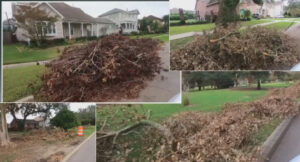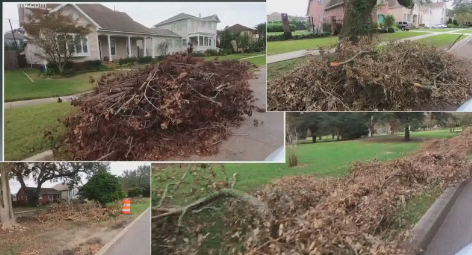 Debris Removal is cleaning up after a natural disaster, such as a hurricane. It involves removing large amounts of debris from an area, making it safe for people to return and begin the recovery process.
Debris Removal is cleaning up after a natural disaster, such as a hurricane. It involves removing large amounts of debris from an area, making it safe for people to return and begin the recovery process.
In addition to requiring commercial liability insurance, debris removal companies should also have a written receipt from the landfill where they dispose of the debris. This will ensure that the debris has been disposed of properly and is not considered hazardous waste. Visit Website for more information about debris removal.
Debris removal is crucial to many clean-up efforts, especially after natural disasters. It also helps clear the way for emergency responders and other workers to aid those affected by the disaster. It can be done using private debris removal services, which specialize in removing various materials. These companies can be found online or by asking for recommendations from friends and family.
After a disaster, it is important to assess the damage and determine the extent of the cleanup needed. In addition to removing debris, it is also important to check for structural damage to homes and other buildings. This can include checking for leaking roofs and windows, assessing the foundation, and identifying potential safety hazards. Hiring professional contractors and inspectors to help with this process is also a good idea.
Once the debris has been cleared, it can be disposed of properly. Most debris removal services have partnerships with local recycling facilities and charities and can often recycle or donate items unsuitable for landfills. They may also use eco-friendly techniques and equipment, which can help reduce waste and protect the environment.
In addition to reducing waste, debris removal services can make it easier for homeowners and businesses to handle large cleanup projects. This can be particularly useful for construction or renovation projects, as they can easily dispose of the excess material afterward. In addition, they can also help homeowners and business owners prepare for future disasters by offering tips and advice on how to avoid or mitigate the effects of a natural disaster.
During a disaster, debris removal is essential to prevent health risks and ensure communities are safe. It is also necessary to repair and rebuild damaged buildings and infrastructure. However, the cost of debris removal is not usually covered by standard property insurance policies. Therefore, seeking specific coverage for debris removal and cleanup is important.
Debris from natural disasters can create dangerous conditions for workers and increase the risk of injury. Workers should wear safety gear and exercise caution when handling or moving debris. This includes protective clothing, eyewear, and gloves. In addition, workers should avoid working in areas where structures are weakened by storm damage. Debris can also threaten wildlife, so it should be removed from habitats. In addition, debris should not be dumped into bodies of water or streams, as it can cause increased stream turbidity and erosion of banks.
Routine maintenance
Debris removal services can help keep your business clean and free of debris and save you money in the long run. They can remove various materials, including branches, vegetation, household items, and construction waste. They can even pick up hazardous waste. If you’re unsure whether or not they can handle your specific needs, check with them directly.
Routine maintenance is an important part of any business, and it’s a good idea to schedule regular debris cleanups. This will help you avoid costly repairs and reduce the risk of liability claims. In addition, it can make your workplace more enjoyable for everyone. Checklists are a great way to ensure routine maintenance tasks are performed consistently, and they can also help you track the status of recurring problems. We’ve put together a list of facility maintenance checklists that you can download for free to get started.
Typically, the responsibility for debris removal from private property lies with the property owner. However, in the case of a disaster that affects many residents and is affecting public health or safety, it’s important to work with local authorities to determine their responsibilities, plans, and timing for debris removal. In many cases, municipalities and counties will contract with a specialized debris removal company in advance of a natural disaster.
The debris removal process can be complicated, especially in areas with a high concentration of private and public buildings. These companies have specialized equipment that can remove debris from hard-to-reach locations. They also have a network of partners that can help them find safe places to store the debris. In addition, they can provide training and exercises for staff members and community leaders.
A debris removal service can take a lot of pressure off homeowners during an emergency situation, and they can usually coordinate with local governments to help you with insurance claims. If the cost of debris removal ends up being less than your policy limits, you may be able to apply the balance toward other repairs or rebuilding expenses.
Debris removal companies need to have a commercial insurance policy to protect their assets. These policies can cover any type of damage to your property, including fire, storm, or theft. They can also include workers’ compensation coverage, which covers injuries to employees. Commercial auto insurance is another important coverage option for a debris removal company. This type of policy can cover any vehicle that you use in the course of your business, as well as any equipment that’s rented or loaned to you by a third party.
Recycling and donation
Debris removal can be a very time-consuming and expensive process. But it’s necessary for preventing environmental damage, maintaining safe communities, and keeping property values up. Thankfully, there are many debris removal companies that offer low-cost services for homeowners and businesses. Many of these companies recycle and donate the items that they remove, helping to reduce waste and protect the environment.
Depending on the type of debris, it may be necessary to sort and organize it before it’s picked up. This can include sorting metals, plastics, and paper from other materials. It’s also a good idea to bundle larger items together and label them. This will make it easier for the cleanup crew to identify and pick up the debris. In addition to sorting and organizing, it’s a good idea to take before-and-after photographs of the debris pile, and to clearly mark it with a flag or sign.
After debris removal is complete, it’s important to properly dispose of the material. This will prevent environmental damage and keep your community clean. For example, it’s important to dispose of hazardous waste, such as asbestos and lead paint, properly. This is important to protect the environment and ensure that these materials aren’t dumped into rivers or oceans, where they can cause damage.
In addition to recycling and donating, debris removal companies may also use eco-friendly techniques and equipment to help reduce waste. This can include using biodegradable bags and trucks that run on alternative fuels. In addition, they may even compost the debris to help reduce the amount of trash sent to landfills.
In some cases, debris removal companies may be able to work with insurance agencies to minimize costs and streamline the process. They can provide a cost statement detailing the cost of removing debris and apply any insurance proceeds that are left over to home repairs or rebuilding. However, it’s important to remember that insurance policies often have specific requirements for debris removal. If you’re not sure whether your policy covers this expense, consult with your insurance agent to find out more.
Cost
Debris removal services are an important part of the clean-up process after a disaster, and they can be very expensive. These services typically include labor costs, dump fees, and transportation. The cost of a debris removal service can also vary based on the type and size of debris. For example, smaller debris like trash and yard waste is usually cheaper to remove than construction debris.
Debris and junk removal are often difficult and time-consuming tasks, but they can be made easier by hiring a professional company. These companies can provide a stress-free experience and handle all aspects of the cleanup. They can also assist with recycling and donation, which can help reduce waste and protect the environment.
When choosing a debris removal company, it is best to find one that specializes in your specific needs and has a good reputation. This will ensure that the debris is removed properly and in a timely manner. In addition, make sure the company has a valid license and insurance.
It is also important to choose a company that offers set rates. This will help you save money and avoid paying unnecessary fees. These rates can be based on the amount of debris, the type of debris, or the location of the debris.
Many homeowners insurance policies include debris removal coverage, but it is not always included as an itemized expense. It is typically a percentage of the direct damage limit, but it may be limited to a specific amount. In this case, the insurer will reimburse you up to a certain amount for the expenses related to the debris removal.
If the debris removal is for a commercial property, it will be more expensive than for a home. It will also require more labor and equipment. Some items that are required for the cleanup process include dumpsters, gas generators, and electric reciprocating saws. These tools are used to remove large amounts of debris quickly. In addition, they are also useful for removing hazardous materials from the property. They are also needed if the property is damaged by a hurricane or other natural disasters.
